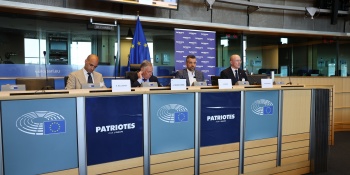Published: 04.05.2020

The right to life from conception, protection of the identity of marriage or parents’ right to raise their children in conformity with their own convictions may be at risk if the European Commission’s proposals enter into force. The EC announced the third “Action Plan on Human Rights and Democracy for 2020–2024”. At the same time, it proposed that the European Council adopt it under the procedure of the European Union’s strategic objectives and interests. On this basis, the Council of the European Union will be allowed to take positions and implement actions and projects which are contrary to the values protected by the Constitution of the Republic of Poland by a qualified majority instead of adopting them unanimously. The Ordo Iuris Institute has prepared a memorandum on this matter.
The “EU Action Plan on Human Rights and Democracy for 2020–2024” presented by the European Commission and the High Representative for Foreign Affairs and Security Policy is of strategic importance for the European Union’s external actions. Radical activists again make unlawful use of the requirement for protecting human rights to push forward ideological concepts. The Plan includes controversial ideas connected with gender ideology and so-called sexual and reproductive health and rights, the use of which, in the international discourse, the Member States have never expressed their common consent.
In order to combat so-called gender-based violence, the European Commission plans to intensify measures aimed at adopting and implementing the controversial Istanbul Convention. This document assumes that “violence against women is a manifestation of historically unequal power relations between women and men, which have led to domination over, and discrimination against, women by men”.
References included in the document to the concept of “sexual and reproductive health and rights” (SRHR) also raise doubts. Importantly, the concept of reproductive rights has been arousing numerous controversies from the very beginning, and radical circles still make use of these rights to widely promote abortion and vulgar sex education. Furthermore, as early as at the International Conference on Population and Development (ICPD) in Cairo (1994), during which this term was officially included in the international discourse, states intentionally did not agree to the creation of a separate category of “sexual rights” due to the ideological character of this term. This position is also maintained today, as exemplified by meetings concerning the Sustainable Development Objectives adopted in 2015. For these reasons, the use of the “reproductive and sexual rights” term by the Commission is completely unauthorised.
Past experience proves that at the UN, the European Union took positions from which some states — including Poland and Hungary — broke away. The divergent positions of Poland and Hungary expressed during the controversial Nairobi Summit and debates on the adoption of Universal Health Coveragewere covered extensively in the media. Both events concerned issues included in the “Action Plan”, such as sex education and reproductive rights. Given the plans communicated by the UN, concerning for example changes in the interpretation of the provisions of the Beijing Platform for Action regarding women’s rights, we have no doubt that there will be even more attempts to formulate similar arrangements.
“It is worth noting that the adoption by the European Commission of the EU strategic objectives in the Action Plan on Human Rights and Democracy means that the Council of the European Union will be allowed to take positions contrary to the Polish constitutional order under the simplified procedure of a qualified majority — instead of adopting them unanimously — and to present them internationally”, commented Magdalena Olek, the Deputy Director of the Centre for International Law of Ordo Iuris.

Wednesday's presentation in Brussels of the European Union reform plan developed by Poland’s Ordo Iuris Institute and Hungary’s Mathias Corvinus Collegium garnered significant interest. Nearly a hundred MEPs and their staff from many countries came to the presentation of this proposal.

• Amendments to the directive on the rights of victims of crime are currently under consideration in the European Parliament.

The candidate supported last Sunday by all the Right for the second round of the Polish presidential election had promised that he would veto any law that liberalizes abortion. He won with 50.89% of the votes against the left-liberal candidate who had promised to ratify any law liberalizing abortion.

• The pressure on the European Union’s southern borders has continued unabated since the great migration crisis of 2015.